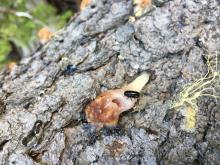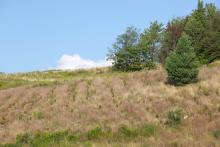UBC researchers have helped developed a cheaper, more efficient way to compile draft genome sequences that could advance the fight against mountain pine beetle (MPB) infestation and improve cancer research.
Current sequencing methods have a variety of advantages and disadvantages--including the cost involved. Dr Steven Jones and colleagues at UBC, the BC Cancer Agency and Simon Fraser University have combined cutting edge hardware with novel software to compile genome sequences at a fraction of the cost of previous methods.
The technique is outlined in the current issue of the journal Genome Biology.
Using the new approach, the research team--which also includes UBC's Joerg Bohlmann, Colette Breuil and Richard Hamelin--has compiled the first complete genome sequence of a fungus (Grosmannia clavigera) that is key to the mountain pine beetle infestation process.
“The key to better preparedness for future forest health crises such as the current mountain pine beetle epidemic lies in better understanding of the three main players–the trees, the bark beetles and a fungus–and their complex interactions,” said Bohlmann, Distinguished University Scholar and professor at UBC’s Michael Smith Laboratories.
“The infestation has affected 10 to 14 million hectares of pine forests in British Columbia. We can’t fight an enemy if we don’t know what it’s made of. The complete genome of the fungus brings us one step closer to winning the battle."
By triggering and overwhelming the trees’ defence mechanism, the fungus weakens the trees and creates an ideal environment for beetles to nest. It also stains the wood blue in the process, making the MPB-affected wood less marketable.
“This study has much wider research implications. What we learned from assembling the draft sequence of a fungus, we can now apply to sequencing human genomes,” says Jones, Head of Bioinfomatics at the BC Cancer Agency’s Genome Sciences Centre. “We're now using this novel approach to decode cancer tumours.”
“The ability to combine molecular biology techniques and computational approaches in this way really helps establish British Columbia as one of the leading jurisdictions in genome science.”
The research was partially funded by Genome BC, the Natural Sciences and Engineering Research Council of Canada, the British Columbia Ministry of Forests, the Natural Resources Canada Genomics program, and the BC Cancer Foundation.
Musqueam First Nation land acknowledegement
We honour xwməθkwəy̓ əm (Musqueam) on whose ancestral, unceded territory UBC Vancouver is situated. UBC Science is committed to building meaningful relationships with Indigenous peoples so we can advance Reconciliation and ensure traditional ways of knowing enrich our teaching and research.
Learn more: Musqueam First Nation
Faculty of Science
Office of the Dean, Earth Sciences Building2178–2207 Main Mall
Vancouver, BC Canada
V6T 1Z4


